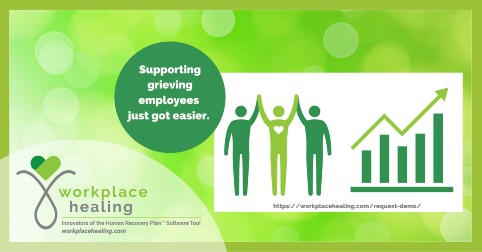
Nine Ways to Support Grieving Employees this Memorial Day
Boost employee morale and employee engagement by observing Memorial Day at work with head and heart-based initiatives.
Many of us eagerly anticipate Memorial Day as a long holiday weekend spent relaxing with family and friends and kicking off the unofficial start of summer. But for grievers, family-oriented holiday weekends can be challenging, presenting stark reminders of the void left behind by deceased loved ones.
As a manager, when you make the effort to thoughtfully connect with grieving employees, you’ll help them feel less alone as the holiday weekend approaches.
 The purpose of Memorial Day.
The purpose of Memorial Day.
For many veterans, active-duty and reserve service members, and Gold Star families, Memorial Day is a sacred day of national remembrance for friends and loved ones who never made it home.
The roots of Memorial Day trace back to General John A. Logan, who led an organization for Northern Civil War veterans and called for a “Decoration Day” in the aftermath of the Civil War. The first national day of remembrance was on May 30, 1868, and 5,000 people gathered at Arlington National Cemetery to decorate the graves of 20,000 Civil War soldiers.
Decoration Day eventually became known as Memorial Day and evolved to commemorate veterans from all of the wars in which American military personnel served and died. Memorial Day became a federal holiday in 1971.
Whether your employee is grieving the loss of a veteran or marking yet another holiday without a loved one, here are a few ways you can offer support this Memorial Day.
- Acknowledge the loss—yes, including suicides.
Memorial Day can bring up complicated emotions. Even if a soldier isn’t killed in combat, they may come home a different person than they were before with physical, mental and emotional wounds, including traumatic brain injuries and post-traumatic stress disorder.
Since 9/11, the rate of military suicides has skyrocketed, with suicides among active-duty personnel and veterans reaching 30,177, which is four times the number of men and women who have been killed in battle.
Not sure what to say to an employee grieving a loved one to suicide? You could say:
“I don’t know what you’re going through, but I’m here for you and I care about you.”
Or: “I wish I had the right words, just know that I care.”
These statements are much more meaningful and compassionate to survivors than blanket statements like “how are you?” or “how are you feeling today?”
Also, offer resources that might be helpful, like the American Foundation for Suicide Prevention’s Healing Conversations program, in which volunteers who are survivors of suicide loss provide ongoing personal support and guidance to those who have lost loved ones to suicide.
- Commemorate Memorial Day.
Decorate the office for Memorial Day and create a display board or virtual wall for your employees to post photos of their loved ones who lost their lives or went missing in action while serving our country.
 War rarely leaves soldiers unscathed. Even if a loved one made it home, they may have had to live the rest of their lives with injuries and traumatic memories. Consider expanding the wall to provide all employees with a chance to honor and remember deceased loved ones who were veterans, including partners, parents, grandparents, siblings, and friends.
War rarely leaves soldiers unscathed. Even if a loved one made it home, they may have had to live the rest of their lives with injuries and traumatic memories. Consider expanding the wall to provide all employees with a chance to honor and remember deceased loved ones who were veterans, including partners, parents, grandparents, siblings, and friends.
- Extend a helping hand.
Taking action to help others can be a healing part of the grief process. (Learn more about post-traumatic growth in our special four-part series.) In honor of Memorial Day, raise funds as a team to support veterans in your community. If you have an employee who is grieving a service member, ask if there’s a particular organization that resonates with them.
Need ideas? Choose from multiple organizations that support veterans, including St. Michael’s Veterans Center which assists homeless veterans in Kansas City, the National Coalition for Homeless Veterans, and Hire Heroes USA, which helps military service members transition into civilian life. Also, check out The Battle Within, which was started in Olathe, KS, by veterans, first responders and community leaders to help warriors heal in mind, body and spirit and reintegrate into their families and communities.
- Support grieving Gold Star families.
 You can also commemorate veterans who lost their lives by sponsoring a fundraiser for families left behind. Organizations like America’s Gold Star Families, Folds of Honor and Fallen Patriots provide college scholarships and other assistance to families and children of military personnel who have died. According to Fallen Patriots, nearly 25,000 children have lost an active-duty parent and many are supported by single mothers.
You can also commemorate veterans who lost their lives by sponsoring a fundraiser for families left behind. Organizations like America’s Gold Star Families, Folds of Honor and Fallen Patriots provide college scholarships and other assistance to families and children of military personnel who have died. According to Fallen Patriots, nearly 25,000 children have lost an active-duty parent and many are supported by single mothers.
- Make space at your table.
Memorial Day isn’t only difficult for families of deceased soldiers. Like any other holiday, family gatherings can be exceptionally difficult in the glaring absence of a loved one. If your grieving employee doesn’t live near family, they may also dread the emptiness of the holiday weekend ahead when everyone else is otherwise engaged with friends and family.
Don’t assume your grieving employee will be spending the weekend with loved ones. If you can, invite them to join you and your family at your holiday barbecue or picnic.
- Show a thoughtful gesture.
 Even if your grieving employee does have weekend plans or declines your invitation, consider sending a card or ordering a flower delivery with a note signed by your team that says: “We know this weekend may be hard for you. We want you to know that we are thinking about you.”
Even if your grieving employee does have weekend plans or declines your invitation, consider sending a card or ordering a flower delivery with a note signed by your team that says: “We know this weekend may be hard for you. We want you to know that we are thinking about you.”
If the employee is a grieving spouse or parent of a military service member who died, consider purchasing a wreath or flowers that they can use to decorate the grave of their fallen warrior.
- Rally your troops.
A team volunteer day can boost employee morale and can be done on-site or off-site. For example, the Tragedy Assistance Program for Survivors (TAPS) is a national military family support organization that sponsors numerous opportunities for workplace giving, including gift cards for military families and a “Fill the Backpack” drive for young survivors attending grief camps, family campouts, retreats, and care groups.
If you’d like to support a local Kansas City organization and get your team moving together for a good cause, check out the Spencer C. Duncan Make It Count Foundation’s annual 5K Run and Walk.
- Listening matters.
 The days leading up to any anniversary or holiday weekend can be difficult for grievers, no matter the nature of their loss or how long it has been since the occurrence of the death. Storytelling can be a healing part of the grieving process, helping grievers make sense of their loss and as a way to keep the memory of their loved ones alive.
The days leading up to any anniversary or holiday weekend can be difficult for grievers, no matter the nature of their loss or how long it has been since the occurrence of the death. Storytelling can be a healing part of the grieving process, helping grievers make sense of their loss and as a way to keep the memory of their loved ones alive.
If you didn’t know your employee’s loved one and they seem open to talking, consider asking them what their family member or friend was like. If you did know the person who died, share a fond memory that you have about their loved one. Most of all, let your employee know that you are available to listen whenever they’d like to talk.
- Support human recovery in the workplace.
At least one in four employees is grieving at any given time. Although people grieve in different ways, grief that goes unacknowledged or is mishandled in the workplace can damage employee morale and company culture, leading to disengagement, low productivity and high turnover.
Support human recovery in the workplace and build a plan that best supports your grieving employee in the days, weeks and months following a life disruption. Learn how by scheduling a demo of Workplace Healing’s easy-to-use, 24/7 Human Recovery Platform™.

